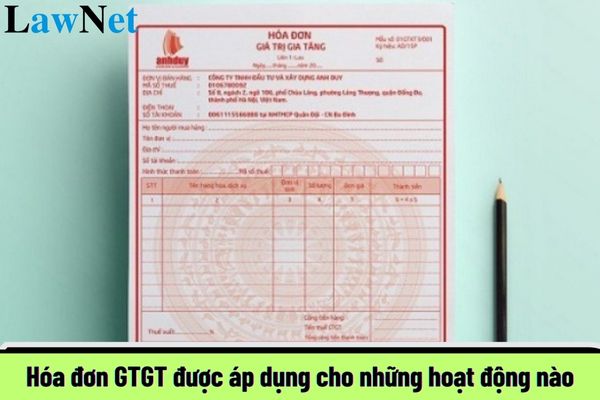Which activities is the VAT invoice applied for in Vietnam?
Which activities is the VAT invoice applied for in Vietnam?
The value-added tax invoice is stipulated in Clause 1, Article 8 of Decree 123/2020/ND-CP as follows:
Types of invoices
Invoices stipulated in this Decree include the following types:
1. Value-added tax invoices are for organizations paying value-added tax using the deduction method for the following activities:
a) Domestic sale of goods and provision of services;
b) International transportation activities;
c) Export to non-tariff zones and cases considered as exports;
d) Export of goods and services abroad.
2. Sales invoices are for organizations and individuals as follows:
a) Organizations and individuals paying value-added tax using the direct method for the following activities:
- Domestic sale of goods and provision of services;
- International transportation activities;
- Export to non-tariff zones and cases considered as exports;
- Export of goods and services abroad.
b) Organizations and individuals in non-tariff zones when selling goods, providing services to the domestic market, and when selling goods, providing services among organizations and individuals in non-tariff zones and between them, exporting goods and providing services abroad, stating clearly on the invoice “For organizations and individuals in non-tariff zones”.
3. Electronic invoices for selling public assets are used when selling the following assets:
a) Public assets at agencies, organizations, units (including state-owned housing);
b) Infrastructure assets;
c) Public assets managed by enterprises not accounted for as state capital at enterprises;
d) Assets of projects using state capital;
dd) Assets established as public property;
e) Public assets reclaimed according to the decisions of competent authorities;
g) Recovered materials from handling public assets.
4. Electronic invoices for selling national reserve goods are used when agencies and units under the national reserve system sell national reserve goods according to legal provisions.
5. Other types of invoices include:
a) Stamps, tickets, cards with formats and contents as stipulated in this Decree;
b) Receipts for aviation transportation charges; international transportation charge documents; bank service charge documents except in cases specified in point a of this clause with formats and contents according to international practices and relevant legal regulations.
....
Thus, according to the above stipulations, value-added tax invoices are applied for organizations paying value-added tax using the deduction method for the following activities:
- Domestic sale of goods and provision of services;
- International transportation activities;
- Export to non-tariff zones and cases considered as exports;
- Export of goods and services abroad.

Which activities is the VAT invoice applied for in Vietnam? (Image from Internet)
What are requirements for the authenticated VAT invoice in Vietnam?
According to Clause 2, Article 17 of Decree 123/2020/ND-CP, the authenticated invoice must meet the following requirements:
- Complete content of electronic invoices as specified in Article 10 of Decree 123/2020/ND-CP.
- Correct format of electronic invoices as specified in Article 12 of Decree 123/2020/ND-CP.
- Correct registration information as specified in Article 15 of Decree 123/2020/ND-CP.
- Not falling under circumstances of suspension of the use of electronic invoices with a tax code by the tax authority as specified in Clause 1, Article 16 of Decree 123/2020/ND-CP.
What are prohibited acts regarding the issuance of VAT invoices in Vietnam?
According to Article 5 of Decree 123/2020/ND-CP, the prohibited acts concerning the issuance of invoices are as follows:
- For tax officials:
+ Causing inconvenience and difficulties for organizations or individuals purchasing invoices or documents;
+ Having acts of collusion, connivance allowing organizations or individuals to use illegal invoices or documents;
+ Accepting bribes during invoice inspections or audits.
- For organizations and individuals selling and providing goods and services, and related organizations and individuals:
+ Committing fraudulent acts such as using illegal invoices or unlawfully using invoices;
+ Obstructing tax officials in the performance of their official duties, specifically, engaging in acts that harm the health or dignity of tax officials during invoice or document inspections or audits;
+ Unauthorized access to alter or destroy information systems related to invoices or documents;
+ Bribing or engaging in other acts related to invoices or documents to gain illicit benefits.

